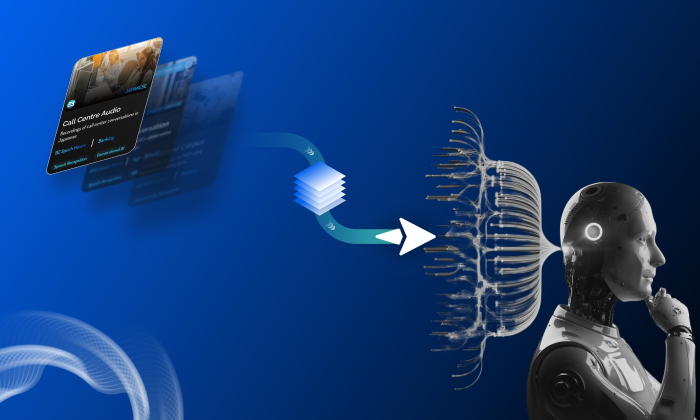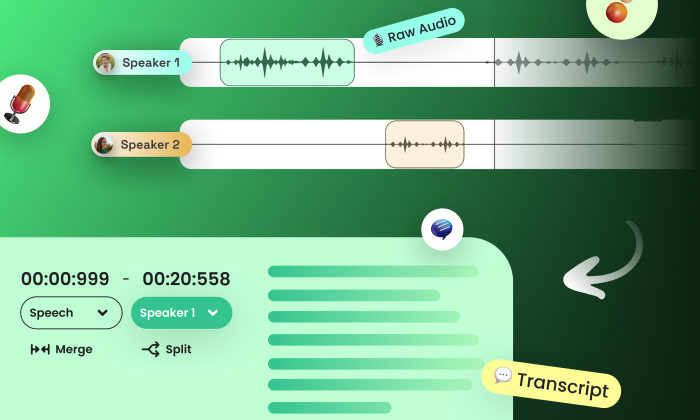What is synthetic speech data?
TTS
AI Development
Speech AI
Synthetic speech data is audio generated by computers to replicate human speech. This technology primarily employs text-to-speech (TTS) systems to convert written text into spoken words. It plays a pivotal role in training and evaluating AI models, such as virtual assistants and speech recognition systems, by providing scalable and diverse datasets that mimic human speech patterns.
The Benefits of Synthetic Speech Data
Synthetic speech data offers several advantages, making it a key asset in AI development:
- Scalability and Cost Efficiency: Generating human-recorded datasets can be costly and time-intensive. Synthetic speech allows for rapid creation of large datasets, saving time and reducing costs without compromising quality.
- Controlled Environment: Developers can tailor synthetic speech to specific needs, controlling factors like accent, tone, and speaking style. This control helps train AI models to perform well across various contexts and demographics.
- Diversity and Inclusion: It enables the creation of datasets that include a wide range of accents, dialects, and languages, ensuring AI solutions are inclusive and cater to global audiences.
Mechanisms of Synthetic Speech Generation and Key Processes
The generation of synthetic speech involves several critical steps:
- Text-to-Speech (TTS) Technology: TTS systems convert text into speech using different methods, such as concatenative synthesis, which pieces together pre-recorded human speech, and neural network-based synthesis, which uses deep learning to produce realistic speech.
- Dataset Creation: A robust dataset of text and audio samples is necessary for training TTS models, ensuring they can generate speech that reflects human nuances.
- Speech Synthesis Evaluation: After generating synthetic speech, it undergoes rigorous quality checks, including human evaluations and automated metrics, to ensure clarity, pronunciation, and expressiveness.
Real-World Impacts and Use Cases
Synthetic speech data is transforming various industries:
- Accessibility Tools: In healthcare, synthetic speech aids visually impaired individuals by providing audio versions of text-based content.
- Customer Service Automation: Retail and service industries use synthetic voices to improve automated customer interactions, providing consistent and efficient service.
- Language Learning Applications: Educational tools use synthetic speech to offer pronunciation guides and interactive speaking exercises, enhancing language acquisition.
Navigating Challenges in Synthetic Speech Generation and Key Trade-offs
While beneficial, synthetic speech data production involves several trade-offs:
- Quality vs. Quantity: Balancing the generation of large volumes of data with maintaining naturalness and expressiveness is a common challenge.
- Model Complexity: More sophisticated models produce higher-quality speech but require significant computational resources.
- Ethical Considerations: Organizations must ensure diversity in voice characteristics and avoid reinforcing stereotypes, maintaining ethical standards in AI development.
Avoiding Common Pitfalls in Synthetic Speech Data Projects
To maximize the effectiveness of synthetic speech data, teams should avoid common missteps:
- Neglecting Quality Metrics: Focusing solely on quantity can lead to poor model performance. Quality metrics that assess naturalness and intelligibility should be prioritized.
- Overlooking User Testing: Engaging diverse user groups in testing ensures synthetic voices resonate with target audiences.
- Ignoring Feedback Loops: Continuous improvement based on user feedback and performance data is crucial for refining synthetic speech models.
Concluding Insights on Synthetic Speech Data Applications
Synthetic speech data is a powerful tool in advancing AI technologies across various sectors. By understanding its benefits, processes, and potential pitfalls, organizations can leverage synthetic speech to develop inclusive and effective AI solutions. For tailored synthetic speech datasets, FutureBeeAI offers expertise in data collection and annotation, ensuring high-quality, diverse, and ethically sourced data for any AI project.
Smart FAQs
Q. What are the key applications of synthetic speech data?
A. Synthetic speech data is widely used in virtual assistants, automated customer service, and accessibility tools, as well as in training datasets for speech recognition models and language learning applications.
Q. How does synthetic speech data compare to human-recorded data?
A. While synthetic data offers scalability and cost benefits, human-recorded data provides richer emotional nuances. Combining both can optimize AI applications for naturalness and efficiency.
What Else Do People Ask?
Related AI Articles
Browse Matching Datasets
Acquiring high-quality AI datasets has never been easier!!!
Get in touch with our AI data expert now!








